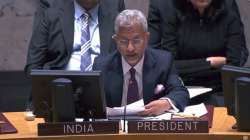'Contemporary epicentre of terrorism remains very much active': Jaishankar's veiled attack on China, Pak at UN
Jaishankar at UNSC: Presiding over the 'UNSC Briefing: Global Counterterrorism Approach: Challenges and Way Forward', External Affairs Minister S Jaishankar lamented that evidence-backed proposals to blacklist terrorists are put on hold by a few countries without adequate reason.

Jaishankar at UNSC: In a veiled attack on China and its close ally Pakistan, Union External Affairs Minister S Jaishankar, on Thursday, asserted that the "contemporary epicentre of terrorism" remains very much active.
Presiding over the 'UNSC Briefing: Global Counterterrorism Approach: Challenges and Way Forward', he lamented that evidence-backed proposals to blacklist terrorists are put on hold by a few countries without adequate reason.
Jaishankar also termed terrorism as an existential threat to global peace and security and said it knows no borders, nationality, or race. "The threat of terrorism has actually become even more serious. We have seen the expansion of Al-Qaida, Da’esh, Boko Haram and Al Shabab and their affiliates," he said in his address at the UNSC.
'The contemporary epicentre of terrorism remains very much active': Jaishankar
Addressing the 15-nation Council, the External Affairs Minister said that at the other end of the spectrum are ‘lone wolf’ attacks inspired by online radicalisation and biases. "But somewhere in all of this, we cannot forget that old habits and established networks are still alive, especially in South Asia. The contemporary epicentre of terrorism remains very much active, whatever gloss may be applied to minimise unpleasant realities," he added.
Jaishankar was ostensibly referring to Pakistan, which is accused by its neighbours of harbouring terrorists and giving safe shelter to a number of terrorist organisations, including al-Qaida, Lashkar-e-Taiba, and the Taliban.
Jaishankar calls for eliminate double standards in combatting terrorism
He also emphasised the need to eliminate double standards in combatting terrorism, raising concerns about politicisation. He also went on to highlight specific challenges with which the counter-terrorism architecture is currently battling.
"Uniform criteria are not applied to sanctioning and prosecuting terrorists. It would seem sometimes that the ownership of terrorism is more important than its actual perpetration or its consequences," he remarked.
'The working methods of relevant mechanisms is matter of concern': Jaishankar
According to Jaishankar, the working methods of relevant mechanisms is also a subject of legitimate concern and debate. "At one level, we have seen protections that come close to justification. Then, there are evidence-backed proposals that are put on hold without assigning an adequate reason. Conversely, there has even been recourse to anonymity so as to avoid taking ownership of untenable cases," he asserted.
His remarks were a strong reference to repeated holds and blocks on proposals by India to blacklist terrorists based on Pakistani soil, in the UN Security Council's sanctions committee by veto-wielding permanent member China.
In the past five months, China, a permanent, veto-wielding member of the UN Security Council, has put holds on as many listing proposals made by India and the US to designate Pakistan-based terrorists under the Council's 1267 Al Qaeda Sanctions Committee regime.
Jaishankar also said that countering threats from the misuse of new and emerging technologies by terrorists is "likely to be the next frontier of battle worldwide.
(With inputs from agencies)